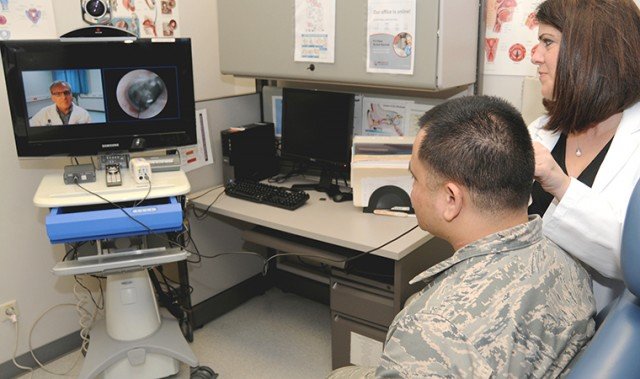
Landstuhl Regional Medical Center Public Affairs Office
Telehealth is paving the way for the future of military medicine in Europe Regional Medical Command. Telehealth bridges the geographical distances between patients and specialty care providers, increases patient access to care, and supports mission readiness.
This innovative approach to military medicine allows specialty care providers at Landstuhl Regional Medical Center to cross commands, countries, and continents to provide high-quality, patient-centered care to beneficiaries residing in or deployed to Europe.
Telehealth is the use of electronic information and telecommunications technologies to support long-distance clinical health care, patient and professional health-related education, and public health and health administration.
LRMC established its Telehealth Program Office in January 2014 as part the Defense Health Agency’s desired end-state to seamlessly integrate Telehealth into routine patient care by the year 2020. Since its inception, LRMC Telehealth has steadily proven its relevancy in today’s military healthcare system in Europe.
Using Telehealth has allowed a variety of LRMC medical specialists to treat patients at outlying Army Health Clinics in Belgium, Germany and Italy, all the while decreasing the need for patient travel to LRMC and reducing time away from work.
Video-teleconferencing technology and advanced medical devices such as stethoscopes allow LRMC providers to listen in real-time to patient heart and lung sounds. Other examples, such as otoscopes to perform real-time ear exams, and general exam cameras to provide dermatology quality skin exams, are helping Telehealth providers to successfully transition from the traditional tele-behavioral health era into a tele-comprehensive specialty care era.
Full-time Telehealth nurses have been hired at Vilseck, Wiesbaden, and Stuttgart Army health clinics to support these high-quality, synchronous appointments between patients and their specialty care providers. Telehealth is also available at other Army Health Clinics in Europe but not currently supported with full-time nurses.
Telehealth nurses are highly trained and qualified to conduct appointments and act as surrogates to assist in the examination for providers and ensure there is no degradation in quality of care when using Telehealth.
“I often find that my patients are initially curious about their Telehealth appointment, but by the end they are surprised and impressed with the quality of their examination and encounter with their provider,” said Robin Smith, a Telehealth nurse at Vilseck Army Health Clinic. Smith is well-versed with Telehealth as both a practitioner and a beneficiary.
“I have also experienced Telehealth as a patient and as the mother of two children that received care via Telehealth,” said Smith. “Receiving care from specialists at LRMC via Telehealth meant my children and I were able to stay in the U.S. healthcare system while living overseas, and it is also minimized the number of trips we needed to make back and forth to LRMC.”
What once may have required a patient to travel multiple times to LRMC may now be reduced to just one trip. With the use of Telehealth, patients can complete their pre-operative and post-operative appointments in the comfort of their own clinic, and only need to travel to LRMC for their scheduled procedure. Additionally, Telehealth supports a variety of patient care needs such as nutritional counseling, sleep study counseling, and educational classes for procedures such as vasectomies.
“Telehealth essentially takes the outlying Army health clinics, with otherwise limited access to specialty care providers, and turns them into their own regional medical centers,” said Erica Taylor, nurse director of the Telehealth Program.
If you receive a referral for a healthcare specialist, ask your doctor or nurse about Telehealth as an option or call the LRMC Telehealth Program Office at 590-4600/civ. 06371-9464-4600.
